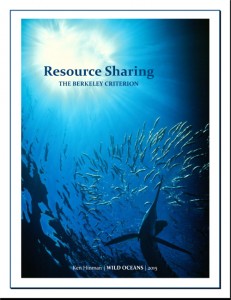Fish populations have limits that cannot be exceeded without causing harm at the ecosystem level. This is especially true for the forage species — including but not limited to the herrings, anchovies, menhaden, mackerel and sardine — that serve the critical role of providing food and energy for all of life above them on the food chain — including us.
Sustainability is the buzzword in fisheries these days, but so-called “sustainable” fishing, by which we mean making sure not to deplete the stock in ways that would jeopardize future catches, can still dramatically alter living communities. The way we fish for key prey species, those whose abundance strongly influences population size of predators (larger fish, marine mammals and seabirds) can upset the delicate balance between predators and prey, restructure food webs and reduce biological diversity. Indirectly, it limits the numbers of commercially- and recreationally-valuable fish such as tuna, salmon, striped bass and cod, to name just a few.
This kind of “ecosystem overfishing,” which has far greater costs — social, economic and ecological — than simply mismanaging a fishery, is permitted under our current management system, despite almost universal agreement that we need to take an ecosystems approach to managing ocean fisheries. Without question, one of the central challenges of that approach is leaving enough food in the water to feed a wide range of marine predators — including ourselves.
On August 10th, Wild Oceans will release Resource Sharing: The Berkeley Criterion, in which I argue for a more natural, more balanced, and far wiser approach to managing marine fisheries, grounded in policies that sustain fishing in a way that protects the broader ecosystem and all life in the ocean.
The 40-page white paper, available for download by signing up on the Wild Oceans web site, explains why our current fishing strategies are ecologically harmful (Part One), dispels common misconceptions about where fisheries management is now relative to where we need to be (Part Two), and summarizes what I see as an emerging consensus among scientists and policy-makers about how we should be protecting the ocean food web, right now (Part Three).
The publication of Resource Sharing comes at a time when there are critical decisions facing the New England, Mid-Atlantic and Pacific Fishery Management Councils, the Atlantic States Marine Fisheries Commission, and the U.S. Congress; decisions that will determine how we define ecologically sustainable fishing in the future. In that future, will we fish as a part of the natural system, as one among many predators? Or will we continue to take the species we want in the quantities we demand, without regard for sustaining other forms of life in the sea?
I’ve spent a good part of the last 20 years studying the science and conservation of forage fish, and I am convinced that a new approach, wherein we deliberately share the resource with other predators, is essential to our co-existence with wild oceans. The future of fishing, I believe, lies in the balance.
You can reserve your free copy of Resource Sharing: The Berkeley Criterion here or go to WildOceans.org.




Ken has been a leader in data driven marine conservation for more than 25 years just since I have known him. He is a man of logic, wisdom and integrity. He puts up with no BS, including mine. Recreational, commercial and artisanal fishermen and the communities that depend on those fishermen, owe Ken a debt that is beyond paying.
Other marine conservation writers may have more glory, more sales and even more readers but the validity and integrity of the work he has published and advocated is unmatched in its consequence. Thanks, Ken for all you do and have done for the Marine Fish Conservation Network, The fish, fisheries and the oceans.